11 Nights | Europe
You will visit the following 11 places:
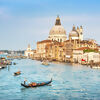
Venice
Venice is a city in northeastern Italy sited on a group of 118 small islands separated by canals and linked by bridges. The city is renowned for the beauty of its setting, its architecture, and its artwork. The city in its entirety is listed as a World Heritage Site, along with its lagoon. Venice has been known as the La Dominante, Serenissima, Queen of the Adriatic, City of Water, City of Masks, City of Bridges, The Floating City, and City of Canals. It has also been described as being one of Europe's most romantic cities. It is truly an amazing, stunning and interesting city for the adventurous to explore!
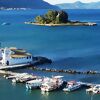
Corfu
Corfu, an island off Greece’s northwest coast in the Ionian Sea, is defined by rugged mountains and a resort-studded shoreline. Nicknamed ''the island of the Phaeacians'', Corfu is home to the Ionian University. Known also as Kerkyra, is the northernmost of the Ionian Islands in Greece. Located off of the far northwest coast of the country, Corfu lies in the Adriatic sea, east of Italy and southwest of Albania. Historically Corfu has been controlled by many foreign powers, notably the Venetians, French, and British.
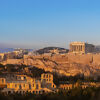
Athens
Athens is the capital and largest city of Greece. Athens dominates the Attica periphery and it is one of the world's oldest cities, as its recorded history spans around 3,400 years. The city is widely referred to as the cradle of Western civilization and the birthplace of democracy, largely because of its cultural and political impact on the European continent and in particular the Romans. In modern times, Athens is a large cosmopolitan metropolis and central to economic, financial, industrial, maritime, political and cultural life in Greece. Its compact downtown, north of campus, is alive with clubs, bars, restaurants, galleries and – of course – record stores; Broad Street in particular is lined with arty shops.

Santorini Airport

Zakynthos
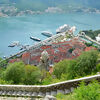
Kotor
Kotor is a coastal town in Montenegro with a population of about 13,500. It is well-known for its World heritage medieval structures (including churches and fortifications) and its stunning natural setting at the very edge of the mountain-rimmed Kotor Bay. It is situated in a most secluded tip of Boka Kotorska bay, in the northern part of the Montenegro coast on the Adriatic Sea. Kotor has developed around Stari Grad (local language for "old town"), the city's old town and best known landmark, which is listed with UNESCO World heritage sites. Kotor Bay is the deepest natural fjord-like bay in the Mediterranean Sea, and the scenery around it (including the steep mountains which come almost straight down to the waters edge) is spectacular.

Monemvasia
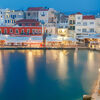
Chania
Chania is the second largest city of Crete and the capital of the Chania regional unit. Lies along the north coast of the island, about 70 km (43 mi) west of Rethymno and 145 km (90 mi) west of Heraklion, it is one of the two places you are most likely to see on arriving in Crete. It is breathtaking - that is to say much of the Chania you will want to see is clustered close to the harbour - old buildings, museums, churches and crafts shops.

Kalamata

Patmos
Patmos is a small Greek island in the Aegean Sea, most famous for being the location of both the vision of and the writing of the Christian Bible's Book of Revelation. Because of the Book of Revelation, Patmos has a long history as a destination for Christian pilgrimage. Visitors can see the cave where John is said to have received his Revelation (the Cave of the Apocalypse), and several monasteries on the island are dedicated to Saint John. In 1999, the island's historic center Chora, along with the Monastery of Saint John the Theologian and the Cave of the Apocalypse, were declared World Heritage Sites by UNESCO. The monastery was founded by Saint Christodulos. Patmos is also home to the Patmian School, a notable Greek seminary.









